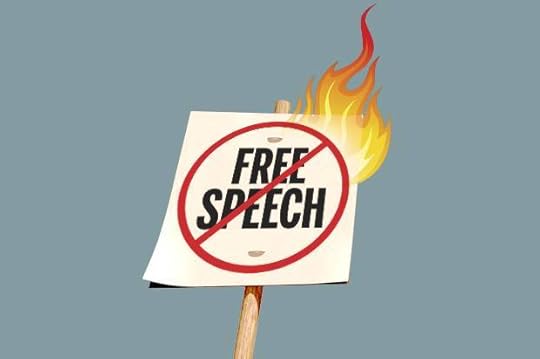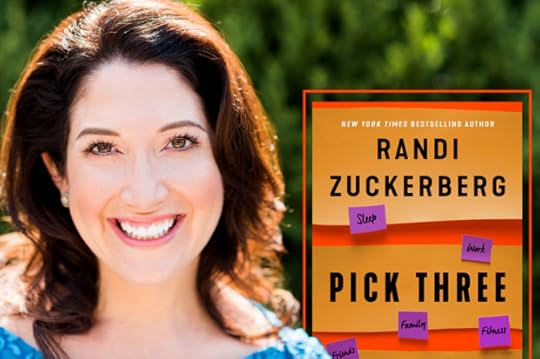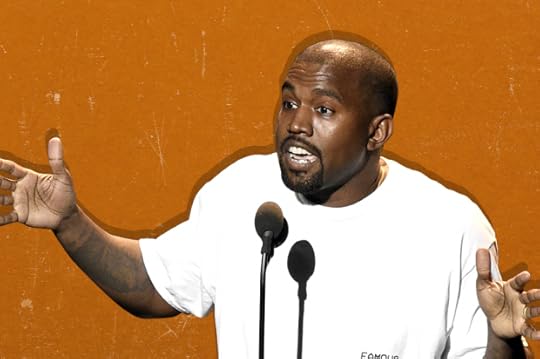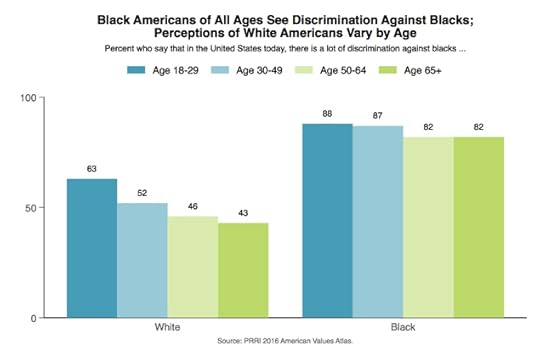Helen H. Moore's Blog, page 75
May 15, 2018
Supreme Court to rule on your First Amendment right to silence

Shutterstock/Salon
This article was originally published on The Conversation.
New Hampshire’s state motto “Live free or die” is, for many residents, a stirring evocation of the independent spirit of colonial America.
But not all New Hampshirites agree with this well-known slogan that is emblazoned on the state’s license plates. In 1975, George Maynard was sent to jail because he didn’t believe in it.
Maynard and his wife were Jehovah’s Witnesses, a Christian denomination that teaches that true believers will enjoy eternal life. The couple felt that the state’s motto violated this tenet. So Maynard covered up the “or die” part on his vehicles’ license plates.
Police gave him three different tickets for illegally altering the plates. When he refused to pay the fines, which totaled US$75, he was given a 15-day jail sentence.
Maynard then filed a lawsuit that reached the U.S. Supreme Court. In 1977, the Supreme Court ruled that the First Amendment gave Maynard the legal right to cover up those two words. In other words, the First Amendment — which guarantees the right to free speech — can also give people the right to remain silent.
Flowing from free speech
I am a legal scholar, so when I learned that the Supreme Court will decide two right-to-silence cases this term the Maynard case came to mind.
The Maynard decision was not the first time the court ruled in favor of a Jehovah’s Witness’ right to be silent. Both decisions hinge on the justices’ determination that the First Amendment includes, in the court’s words, the right “to avoid becoming a ‘mobile billboard’ for the State’s ideological message.”
It may sound contradictory to say the right to be silent flows from the right to speak, but it is not.
The First Amendment protects a person’s right to convey his own message, to voice her own ideas and not to be compelled to publicly disclose personal beliefs and associations. When the government tries to compel a person to speak its message, these rights are seriously damaged.
The right to free speech is likewise violated when people are required to associate themselves with an idea with which they disagree.
This issue first came before the Supreme Court in 1943, when a West Virginia school board expelled a Jehovah’s Witness student for refusing to recite the Pledge of Allegiance because saluting the American flag salute would violate the biblical command “Thou shall not bow down to graven images.”
The court, then lead by Chief Justice Robert H. Jackson, agreed. The First Amendment prevents the government from forcing citizens to express patriotism by saluting the flag.
“If there is any star fixed in our constitutional constellation,” Jackson wrote, “it is that no official, high or petty, can prescribed that what shall be orthodox in politics, nationalism, religion, or other matters of opinion, or force citizens to confess by word or act their faith therein.”
Carrying the government’s message
The first case that will return this issue to the Supreme Court’s scrutiny in 2018 is National Institute of Family and Life Advocates v. Becerra. It involves religiously based “crisis pregnancy centers” in California that try to discourage women from seeking an abortion.
New legislation requires those centers to post notices about other women’s health services available in the state, including abortions.
The pregnancy centers have sued the state, contending that the law forces them to speak the government’s message. California contends that the law is a reasonable regulation of licensed medical facilities.
It will be up to the Supreme Court to decide if the clinic’s claimed right “to avoid becoming the courier for the State’s ideological message” is a valid interpretation of the First Amendment.
Disagreeable association
The second right-to-silence case before the Supreme Court this term, Janus v. American Federation of State and County Municipal Employees, tests the related guarantee that people cannot be forced to be associated with an idea they do not hold.
Forty years ago, the court ruled that a union can require non-members to pay an “agency fee” for their representation by the union. The union may not use any part of the agency fee to advance ideological purposes unrelated to the union’s primary function of collective bargaining.
Now, with Janus v. AFSCME, non-union public employees contend that the required agency fee violates their First Amendment rights because it is not possible to separate bargaining collectively from advancing ideological purposes.
For government workers, they say, issues like salaries, pensions and benefits are inherently political for government workers. And some employees may not agree with the union’s position on those matters.
The unions contend that since all employees benefit from the union’s collective bargaining efforts, allowing workers to opt out of paying the agency fee would enable “free riders.”

Regardless of how the court rules in these two cases, the American right to silence is on trial this year. Both Janus and National Institute of Family and Life Advocates will be decided by the end of June, when the court closes its present term.
Robert A. Sedler, Distinguished Professor of Law, Wayne State University
Top Trending
Check out what's trending in the news right now.
May 14, 2018
These AirPod alternatives won’t break the bank

It can be frustrating to switch between different types of earbuds, earpieces, and headphones for your listening needs — these TREBLAB X11 Earphones help you streamline to just one powerful, wire-free set.
These earbuds include advanced features like passive noise cancellation and a built-in mic, helping you hear your soundtrack or calls with total clarity. Hear rock-solid bass and crisp treble without interference from outside sounds, and accept calls with a simple and easy touch. Plus, the secure ear fins give you truly sweat-proof flexibility for any activity, so you won't need to worry about your earbuds falling out during a rigorous workout.
Whether you're working out, running an errand, or getting ready for your daily commute, these earbuds are your best bet for a new everyday listening experience. Usually, these TREBLAB X11 Earphones are $199.99, but you can get them now for $32.99, or 83% off.
Goodbye, “New Girl”. . . Hello, old dudes!

Ray Mickshaw/FOX
You had to know that the day would come when Jess (Zooey Deschanel), Schmidt (Max Greenfield), Nick (Jake Johnson) and Winston (Lamorne Morris) would move out of that weird cool loft they called home on Fox’s “New Girl.”
Seven years is a long span for anyone. For adults in their early thirties, seven years marks the bridge between the relatively carefree time of early adulthood and acceptable of midlife responsibility.
That’s only one of the reasons “New Girl” had an expiration date smacked on it from year one. More obvious was the inevitability that the show would outgrow its title, though Deschanel’s Jessica Day was constantly finding herself in fresh situations that gave the title definition long after Jess settled into the established harmony of the messy boy’s club she moved in to.
From the moment Jess crosses the apartment’s threshold in the first season, she becomes the resident Manic Pixie Dream Girl (thanks again, Nathan Rabin!), a lively Margaret Keane painting brought to life complete with a twang-and-piano theme song sung by Deschanel herself. The season 1 opening credits only added to the show's meringue-fluffiness: light, sweet, harder to do than it looks and impressive when pulled off to perfection.
Soon after her arrival sunshiny Jessica Day, recovering from a recent heartbreak, helps keep everybody’s friendships in bloom, injects regular doses of sexiness to the place owing to her close friendship with a model named Cece (Hannah Simone) and forces Schmidt to increase his contributions to the loft’s famous Douchebag Jar.
There is no denying the infectious quality of the new girl’s cuteness, and for a time a share of America fell under her spell.
Cuteness is a fleeting state, highly perishable even when it’s repackaged as “adorkability,” as Deschanel’s je ne sais quoi was described while she was in season. Thank goodness Jess was permitted to fall into a consistency of professional prowess commensurate to her experience; thank goodness the show’s creator Elizabeth Meriwether naturally evolved the character from that “girl” to a more recognizable version of a grown woman, albeit one as immature as the men around her.
At any rate, eventually the purported “newness” of Jess ceased to be the source of the comedy. By then, too, much of the show’s first season audience had found other diversions.
Does this matter as Jess and the gang head into their final hour, this Tuesday at 9 p.m.? Probably not as much as we might have thought when “New Girl” first premiered. It was never a boundary-shattering, creatively adventurous series, and it never came across in a way that indicated its writers held such lofty aspirations.
But was a comfortable, breezy show that sailed on an innocent, ribald brand of humor. It also helped us to appreciate the comedic gifts of Greenfield, Johnson and Morris — Greenfield most of all. Whenever he's in his douchey prime, Schmidt is a work of magnificence.
Mainly the show appealed to a type of viewer that valued sweetness and quirk. Don’t knock that crowd — remember, it included the late, great Prince, who was such a devoted fan of the show that he asked to do a guest star appearance which, in turn, he slayed. That third season episode, which aired in the wake of Super Bowl XLVIII in 2014, was seen by a staggering 26.3 million viewers.
And now? Just shy of 1.5 million on average have been tuning into the eight-episode swan song season for “New Girl,” less than a quarter of the 8.22 million viewer average the series boasted in its first season. Compared to the curtain calls for other veteran, formerly “zeitgeisty” shows, the exit for “New Girl” is likely to be a muted one.
To those of you who, like me, used to watch it but for fell away for any of a variety of reasons, allow me to propose one last live tune in for the finale. This isn’t said due to a hint of any significant surprises that will grant the show a place in TV finale hall of fame, mind you. Seeing Schmidt and Cece as a parents is as heartwarming as we knew it would be. Knowing Winston has landed in a place of stability, with a stable relationship and a kid on the way, leaves his story in a satisfying place as well.
I’ve seen the two-part series closer, and I can tell you that “New Girl” ends in a way that’s entirely predictable and traditional and fine and good: Nick and Jess started out as the loft’s “will they, won’t they" couple, and now they’re getting married.
Sadly this joyous event happens at the same time that they realize they have to leave the loft where they first met. There are guest appearances, including Dermot Mulroney, Rob Reiner, Jamie Lee Curtis and June Diane Raphael. There are hijinks and unexpected developments designed to produce aw-shucks sequences, as is the norm.
This finale also marks the end of an epoch for Fox, in that the comedies arriving in its immediate wake will no longer be driven by wackiness or youth or even a female star. As we reported last week, the presumed tentpole of Fox’s fall comedy line-up is its revival of “Last Man Standing,” starring Tim Allen as a late middle-age guy who never would have let Jess into the loft’s testoster-zone in the first place.
This is not a joke. Here’s the official description from Fox, in case you never watched “Last Man Standing” when it aired Fridays on ABC: “A fan-favorite for six seasons, ‘Last Man Standing’ stars Allen as Mike Baxter, a married father of three girls, who tries to maintain his manliness in a world increasingly dominated by women.” Later, ladies. He-Man's back in the house.
Over the years Jessica Day and Deschanel herself have inspired discussions about feminism, specifically whether Jess should be considered a feminist figure or if Deschanel fits the bill. Deschanel replied to this with a famous shot across the bow delivered in 2013 when she said, in annoyance, “I want to be a f--king feminist and wear a f--king Peter Pan collar. So f--king what?"
She had a point. The problem was that America grew tired of Deschanel's signature twee-ness, an inevitable product of trend saturation. The actress seemed to be everywhere you looked for a time, either in the flesh or in the form of Jess Day imitators wearing thick glasses and A-line skirts. (Bonus points if this was done while strumming a ukulele.) Jess, with her endless supply of dresses and her kooky domestic habits — including, on the occasion of a past Thanksgiving, attempting to thaw a frozen turkey in the dryer (Hey girl! Whatcha doin’?) — would seem to represent everything Mike Baxter detests.
And Fox must be wagering that as Mike Baxter goes, so goes our nation. One camp's regressive brand of humor in the midst of a culture-wide rise in feminism is another's way of speaking to an underrepresented audience. On a Monday morning conference call held in conjunction with the network’s Upfronts presentation, Fox executives shot down any implication that Allen’s appeal among conservatives inspired the network’s interest in his show’s revival.
Fox TV’s Group’s co-chair and CEO Dana Walden did admit that the success of “Roseanne,” along with the passionate support for Allen and the show since its cancellation at the end of 2016, reminded them “we have a huge, iconic comedy star in our Fox family in Tim Allen.” (“Last Man Standing” is produced by 20th Century Fox Television.)
Between that and the network’s success with adding NFL football to its Thursday line-up, it appears that for the time being, "Last Man Standing" will be setting the tone. And if that tone happens to be in the same register as the Fox News Channel’s target audience as opposed to Fox’s longstanding 18-to-49 demographic, that’s simply an effort to be a more successful broadcaster.
In all honest, as I stated previously, “New Girl” has long been past its prime. Walden points out that Allen’s sitcom was pulling in an average of 8.5 million viewers over the course of its final season on ABC. On a Friday night, no less. “New Girl” also is among the final remnants of an age of sitcoms following the adventures of young urbanite apartment dwellers (although if you don’t count “The Big Bang Theory,” it’s pretty much the last one). One day a successful ensemble comedy about young adults living together will make it on some network's prime-time schedule, but thus far it does not appear to be a defining trend of the upcoming season.
Fox isn't completely remaking its schedule in the image of "Last Man Standing," mind you. But its new comedies do have a, shall we say, interesting common theme. See if you can spot it: Sunday nights include the debut of "Rel," starring Lil Rel Howery as a man who starts over after he learns his wife is having an affair. (In the plus column, one of its executive producers is Jerrod Carmichael.) Paired with “Last Man” on Fridays is “The Cool Kids,” starring David Alan Grier, Martin Mull and Leslie Jordan as three men in a retirement community who consider themselves to be top dogs until a woman (Vicki Lawrence) moves in to “challenge their place.”
Based on its trailer, Lawrence’s character starts out as an interloper, not someone these men would give a chance or a warm welcome. Maybe she'll emerge as the character who gets the best lines and the last laugh. Let's hope she's written intelligently because from the way things stand, Fox really will be need of a few good women.
Salon Talks: Noël Wells
California reaps $60 million in marijuana tax revenue, loses $7 billion to gig economy

Getty/Spencer Platt
Recreational marijuana boosters have long cheered the potential for recreational marijuana to fatten state coffers by providing a new source of tax revenue. Yet as the state reveals its 2018 recreational pot tax revenue, it seems unlikely that recreational marijuana will fundamentally transform the social welfare of Californians — particularly when you compare those taxes to the amount of money California has lost from the Silicon Valley–led charge to leech the state of revenue by misclassifying their core workers as independent contractors.
This past Friday, California Governor Jerry Brown publicly released the state's revised budget, revealing that tax revenue on recreational marijuana — which is legal in the state as of January 1, 2018 — approached $60.9 million thus far in the year. That suggests the state may fall short of previous projections that California would reap $185 million in the first six months of 2018.
And yet the potential gains from recreational marijuana taxes — which the state’s Department of Finance believes will reach $630 million in the 2019 fiscal year — pale in comparison to the amount of money the state has lost from unpaid payroll taxes, driven by companies like Uber and Lyft who dodge paying them by misclassifying their core employees as contractors.
Unlike regular employees, independent contractors aren’t subject to normal labor laws: no rest breaks, no overtime, and no need to guarantee a minimum wage. Accordingly, no benefits and payroll taxes are paid by companies hiring them. While many sectors use independent contractors, Silicon Valley’s “gig economy”–related companies in particular have used and misused the classification to save money, dodge taxes, and get away with paying their workers less; that's why you see periodic reports of gig economy workers making less than minimum wage. In the case of Uber and Lyft, two of the biggest companies that rely on a veritable army of independent contractors, drivers are paid commissions on each ride they give, and are not reimbursed for gas or maintenance.
As a result, rideshare drivers receive wages that vary depending on demand, and can easily dip below minimum wage even before expenses are taken into account. Moreover, by not paying payroll or other taxes on these employees, companies like Uber, Taskrabbit and Lyft save even more money on their core laborers.
Lately, the state of California has been awakening to the reality that misclassification of workers as independent contractors has been sapping the state of funds. Indeed, the California Labor Commissioner reports that misclassification of workers as independent contractors costs California $7 billion a year in lost payroll taxes. That’s a sum that makes the projected revenues from pot taxes look like chump change. And for a state that is a far cry from the socialistic welfare state that right-wing detractors imagine it to be, it’s the kind of cash that could actually help solve the state’s pressing social problems: joint housing crises in the Bay Area and Los Angeles, grossly underfunded and overexerted public transit systems, and an increasingly pricey and unequal public university system that was once a gold standard.
Interestingly, the April 2018 state superior court ruling in Dynamex Operations West, Inc. v. Superior Court may soon have an effect on misclassification in California. In that case, two delivery drivers, who were classified as independent contractors, sued their employer Dynamex for not classifying them as employees — claiming that it violated both the California Labor Code and the Industrial Welfare Commission rules. The ruling in that lawsuit set a higher bar for what kinds of employees may be categorized as independent contractors; specifically, the hiring business must prove that workers are “free from control” of their employer, and that said worker “performs work that is outside the usual course of the hiring entity’s business.”
That second point is the sticky one: it would seem to suggest that, say, a taxi company’s taxi drivers are a core constituency of said company, and thus not something that can be justified as contract labor. Yet it remains to be seen if the ruling will fundamentally change the way that independent contractors are hired in California. If it does, and more independent contractor jobs are transformed into full-time employees, it would be a win for both workers and Californians.
Fox News’ Tomi Lahren slammed for xenophobic and historically inaccurate comments about immigrants

FOX News
Fox News contributor Tomi Lahren is back in the headlines for offering up fresh historically inaccurate and inflammatory political commentary. This time, her vitriol was aimed directly at immigrants.
"These people need to understand that it's a privilege to be an American — and that's a privilege that you work toward. It's not a right," Lahren said Saturday during a segment on Jesse Waters' "Watters’ World". "You don’t just come into this country with low skills, low education, not understanding the language — and come into our country, because someone says it makes them feel nice. That’s not what this country is based on."
.@TomiLahren: "You don't just come into this country with low skills, low education, not understanding the language and come into our country because someone says it makes them feel nice. That's not what this country is based on." @WattersWorld pic.twitter.com/Dux0cABHar
— Fox News (@FoxNews) May 13, 2018
"The fact that we care more about feelings and kinship over actually improving the United States of America is the problem," she continued.
Lahren's comments were delivered in defense of President Donald Trump's Trump's embattled chief of staff John Kelly, who told NPR last week that undocumented immigrants were "not people that would easily assimilate into the United States, into our modern society."
"They’re overwhelmingly rural people. In the countries they come from, fourth-, fifth-, sixth-grade educations are kind of the norm," the retired general continued. "They don’t speak English. Obviously, that’s a big thing . . . They don’t integrate well. They don’t have skills."
As The Wrap pointed out, a poem engraved on the Statue of Liberty reads: "Give me your tired, your poor, your huddled masses yearning to breathe free." But Lahren is famous for her far-right hot takes – and not for checking her facts. Not surprisingly, Twitter came through with a fact check.
Walter Shaub, who formerly served as the director of the Office of Government Ethics, said he would trade Lahren, whom he referred to as "Xenophobic Rage Barbie," for a hard working immigrant any day of the week. "Contributing less than nothing to this country, she exists only to make lazy white supremacists 'with low skills, low education, [barely] understanding the language' feel nice," he tweeted.
I’d trade Xenophobic Rage Barbie for a hard working immigrant any day of the week and twice on Sundays. Contributing less than nothing to this country, she exists only to make lazy white supremacists “with low skills, low education, [barely] understanding the language” feel nice.
— Walter Shaub (@waltshaub) May 13, 2018
Many others encouraged Lahren to take a history lesson. "Can someone bring Tomi Lahren to Ellis Island?" tweeted Ian Bremmer, a global research professor at New York University.
Can someone bring @TomiLahren to Ellis Island? https://t.co/u1hLEONxVs
— ian bremmer (@ianbremmer) May 13, 2018
There isn’t a better example of low skills, low education and not understanding the language than this comment by @TomiLahren. https://t.co/BQUkBJOTYb
— David Goodman (@DavidAGoodman) May 14, 2018
In our field, there was an uneducated guy named Joe from Hungary, who spent his extra hours in his first year here in the St. Louis library, learning a new language. His legacy? The prizes for excellence and understanding that bear his last name: Pulitzer.
— David Beard (@dabeard) May 14, 2018
Says a pundit with low skills and obviously low education. Hey @TomiLahren, try reading a U.S. history book sometime, or have somebody translate one into Foxnews speak for you. https://t.co/ysPLaDflN6
— David Shuster (@DavidShuster) May 13, 2018
Tomi did you learn ANYTHING in school?
Over 80% of immigrants to USA before World War 1 could not read or write English. Most did not have high school educations.
No/low skilled labor is what made America great.
Do yourself a favor. Stop pretending to be smart.@TomiLahren https://t.co/4P4pQEvGoI
— An_Anonymous_Source (@Logic_Triumphs) May 14, 2018
But your ancestors did @TomiLahren. And John Kelly’s. https://t.co/WEhWV4dmpD
— rolandsmartin (@rolandsmartin) May 14, 2018
But Lahren only doubled down Monday, alleging on Twitter that 62 percent "of households headed by illegal immigrants are receiving some type of federal assistance." She added, "Does that hurt your feelings? Too bad."
62% of households headed by illegal immigrants are receiving some type of federal assistance. That’s more than 2x the percentage for households headed by native-born Americans. Does that hurt your feelings? Too bad. https://t.co/biFN6vgori
— Tomi Lahren (@TomiLahren) May 14, 2018
On "The View" Monday, the show's cohosts responded to Lahren's remarks. "When did the perception of immigrants go from people trying to find their American dream to isolated freeloaders?" co-host Whoopi Goldberg asked. "Because, true, people have always come from other countries . . . Many of them are well-educated and well-versed in many things, but not necessarily in English. And, when they got here, they became peddlers or they became people that opened small stores."
Co-host Joy Behar interrupted. "She talks about low skills — what exactly are her skills?" she asked to thunderous applause. "Does anybody know?"
Co-host Sunny Hostin brought up research a genealogist had conducted into Lahren's family background, who found generations of kin who spoke no English after decades of living in the U.S.
"She doesn’t even know her own history. She certainly doesn’t know this country’s history," Hostin added. "What happened to, 'Give me your tired, and your poor, and your weak and we’ll welcome you with open arms?'"
Except the 1930 census says Tomi's 3x great-grandmother had been here for 41 years and still spoke German.
Her 2nd great-grandmother had been here for 10 yrs. Spoke no English.
Her great-grandfather's 1895 baptism from MN? Recorded in Norwegian.#resistancegenealogy #receipts pic.twitter.com/rIySFu6fvL
— Jennifer Mendelsohn (@CleverTitleTK) May 13, 2018
As of Monday afternoon, Lahren remained unmoved by the criticism. "The Left can't fathom the idea of merit based immigration," she proclaimed on Twitter. "Get a clue. It's not radical to place Americans first in our own country!"
The Left can’t fathom the idea of merit based immigration. Get a clue. It’s not radical to place Americans first in our own country! https://t.co/PfBejPB0j2
— Tomi Lahren (@TomiLahren) May 14, 2018
Disgraced Trump campaign manager joins Team Pence

AP
Corey Lewandowski, former campaign manager for Donald Trump, has joined Vice President Mike Pence's political action committee, Fox News first reported.
The new position "will enable him to travel with the VP and puts him firmly back in the president’s 2020 reelection orbit, say sources familiar with the move," according to Fox News. "Lewandowski discussed the move with Trump before accepting the offer and is taking the job with the president’s blessing, these sources say."
Lewandowski confirmed the news via Twitter Monday. "Proud to be joining the Great America PAC," he wrote, adding that Trump and Pence "continue to fulfill the Camapign [sic] Promises they made to Make America Great Again! The Rep’s will expand majorities in the Senate and hold the House to keep America moving forward."
Proud to be joining the Great America PAC. @realDonaldTrump and @MikePenceVP continue to fulfill the Camapign Promises they made to Make America Great Again! The Rep’s will expand majorities in the Senate and hold the House to keep America moving forward. https://t.co/p1Frn4YHMi
— Corey R. Lewandowski (@CLewandowski_) May 14, 2018
Lewandowski was Trump's campaign manager for a year and a half leading up to the Republican nomination and was fired by the president in June 2016 ahead of the general election. He was also charged with battery after he was accused of forcibly grabbing a reporter. The charge was eventually dropped, but throughout, he and the president remained close.
Lewandowski was also accused of sexual misconduct by Trump supporter and singer Joy Villa. She filed a report against the strategist alleging that he slapped her butt during a holiday party on Nov. 28. "I was shocked and embarrassed," she tweeted the next month.
Here’s the photo of @CLewandowski_ seconds before he slapped my ass, I told him to stop, and then he did it again. I was shocked and embarrassed by his behavior. https://t.co/61EYvOG4e9 pic.twitter.com/a8NgLnvCEZ
— Joy Villa (@Joy_Villa) December 23, 2017
Villa described the alleged assault as "almost violent in nature." She said that she tried to contact Lewandowski for an apology, but hasn't heard back.
"I think as someone who has been through this, you understand that there is a due process and there is a process which they will go through to determine a person’s innocence," Lewandowski told Fox Business’ Charles Payne late last year, responding to the claims. "I think you’ve been through, and you understand it and you respect it."
Lewandowski authored the book "Let Trump Be Trump: The Inside Story of His Rise to the Presidency," published last December, and contributed as a political commentator to several cable news networks since he left the Trump campaign. But his new job working alongside Pence means he will leave his current employment with the pro-Trump America First Policies group, where as a nonprofit, he faced some restrictions to open political activity and collaboration with the Trump administration.
"The move will not only deepen Lewandowski’s ties to Trump’s second-in-command but instantly make him a player in the midterms, a growing source of concern for the president," Fox reported. "The Pence committee donated more than $150,000 to Republican congressional candidates in February."
Brian Walsh from America First told CNN that he is "disappointed that we are losing him, but happy that he's joining Great America Committee."
Lewandowski's hiring comes after a New York Times story claimed Pence is "trying to control Republican politics" and reported of tension between the two top political teams.
"It was Trump who asked Lewandowski to sign up with the vice president's team, according to a Republican source," NBC News reported. "Lewandowski's arrival sends a signal that, while Trump and Pence are aligned, Trump is the boss," according to an unnamed "GOP donor who had been informed of Lewandoski's plans."
Stop trying to “have it all” all at once: Try living the “well-lopsided” life instead

Ben Arons/Harper Collins
Having it all is overrated. Worse, it's damn near impossible. Entrepreneur and author Randi Zuckerberg has a counter offer. On any given day, have just three things instead. You get to pick.
In her career, Zuckerberg worked at Ogilvy & Mather and Facebook before launching Zuckerberg Media and the online community Dot Complicated. The mother of two and author of three previous books (including two children's books) is now advocating for better balance in her new book: "Pick Three: You Can Have It All (Just Not Every Day)."
Salon spoke to Zuckerberg recently about the menu approach to an overwhelming life, and why sleep needs a place on your to-do list.
We are all spread so ridiculously thin. What made you say, "All right, I need to articulate this into five points and then turn it into a book"?
When I first started thinking about this topic, I have to admit I was thinking about it under the guise of how entrepreneurs can handle it. I was sitting in the middle of Silicon Valley. I was in the process of starting my own business, and I was just thinking, "Wow, entrepreneurs are really spread so thin, how do you do it? "
But over time, I became a mom myself. I saw how in the workforce over the past few years, we're all expected to do so many jobs. Most people have their job; they have their side hustle. You're expected to be very entrepreneurial inside your current job. There's just so much expected of all of us, whether we have children or not. There's also so much that's unpredictable. There's so much that happens to us that we have to be extremely resourceful and reactive to.
That led me to feel like now was the right time to open up a discussion on work/life balance. It just felt like, what we aspired to ten years ago was just so outdated and so unattainable today in the new world. In my life, the choice has always been about being a little more lopsided at prioritizing things in order to be well-balanced in the long run. I really wanted to share that with more people who are feeling guilty and feeling spread too thin.
Let's talk about your concept of being lopsided, because that is a key element to this way of looking at how we're using our time. Talk to me a little bit about what it means to be lopsided.
It's interesting because all of the literature that's out there would have us believe that we need to be perfectly balanced in a 24-hour period. Do our work, come home and spend time with our families and do our hobbies.
For me that’s never resonated, even when I was a student in high school. I was always the kind of person who achieved the most success when I was singularly focused on something. I could really dive into something and achieve great results, and then turn my attention to something else and dive into that. I remember around the time of applying to college that a lot of my teachers tried to temper my expectations, saying, "You're not the kind of well-balanced candidate that colleges look for. Don't be disappointed if you don't get into your top choices."
It was only when I went to start looking at a few schools and heard them coin the phrase that they look for people who are "well-lopsided," that this vision articulated for me. I know in my life when I look back at things that I've done that I'm most proud of, that I hope I'm alive to tell my great-grandchildren about, it's definitely not going to be the time that went to work until five and then came home and put dinner on the table. No, it's going to be the times that I would be completely lopsided and I was able to achieve things that I was incredibly proud of. I just want to give people, especially women, the permission to really go for it and not feel like you have to do everything every day. In fact, being lopsided, I think, is more of a key to being successful and happy than trying to have everything.
You talk in the book about the first time you really heard that term, "lopsidedness." The whole idea of juggling is that you're keeping balls in the air perfectly symmetrically at all times. Single tasking has been given tremendously short shrift, and you're really talking about that.
If you try to do everything in one day, what's going to happen is you're going to either do none of those things, or you're just going to be mediocre at all of them. You're not really going to have an outcome you're proud of, especially if you're thinking about this from a work perspective. If you're only able to give 50 or 60 percent, someone else out there, they’re giving 100 percent and you're going to be passed by. If instead, you just pick you the areas of your life, just be able to give a 100 percent to, you are going to achieve success. You're going to be happier. You're going to feel proud of yourself, which is going to bleed into other areas in your life. Living by that philosophy has just completely redefined how I view success. It's enabled me to redefine so much of guilt that I was carrying around of not being the perfect mom and doing everything perfectly all the time.
What you're saying is yes, you can be that person who is giving a 100 percent to her job or 100 percent to her family, but you can't do that every day.
That’s exactly right. I’m not saying to take only three things and then you're stuck with them until the end of time. No, I'm saying just in any 24-hour period, give yourself permission to just do three things really, really well, so when you reach the end of the day you're like, "I chose three things, I did them really well. Tomorrow, I'm either going to choose the same three or a different three and look at balance as something to be achieved in the long run rather than in a one-day period."
It reminds me also of that concept of fasting for two days. You break up your week and you have five days where you do this and two days where you do that, and that's how you achieve balance. It seems lopsided, but ultimately for the people that it works for, you get this balanced perspective of how you're living your life. Let's talk about the five, how you came up with the five and what those five are.
To your point about fasting, really what "Pick Three" is about is setting intent and being mindful about how you spend your time, just like fasting is about being mindful of what you put into your body. I'm a big fan of anything that gets you thinking and being really thoughtful about how you are spending your time or your nutrition.
The five categories are work, sleep, family, friends and fitness. They're purposely very broad categories that can encompass anything. For example, family. Not everyone has a biological family. Family could apply to you, a community, a religious group, a group of people with whom we feel you belong. Friends is anything brings you fun, so that can apply to hobbies and activities. Fitness applies to all areas, not just pumping iron at Gold's gym. That’s your emotional and mental fitness as well.
One of the things that I really love is putting sleep on that list. Sleep is such an unsexy thing to talk about. It's sexy to talk about work. It's sexy to talk about fitness. But sleep, what are we going to say?
I think you're right, unfortunately. We have a culture that celebrates overworking. If you say, "I was up all night working," we celebrate that. I think that's dangerous as a culture to celebrate. I believe of all the other categories, if you don't pick them for a while, it takes a long time to really feel the effects of not picking them. When I had my babies, I went a long time without thinking about friends. You could go a while before you start to realize, "Oh hey, people aren't inviting me to things." But sleep — if you miss it one night or two nights, you can feel it right away. You feel the effects on your body and feel it on your mental clarity in your performance. When you do get a good night's sleep and you wake up, I feel like I discovered the elixir of life. Like I’m in on this secret of the universe, but no one else knows.
It was interesting to dive more into the research of sleep. The psychology, the performance aspects of how it affects the rest of your day and your mental clarity. It was pretty shocking to me, the research I uncovered about how one night of being sleep deprived increases your risk of cancer and heart disease. How during daylight savings, when we fall back an hour and everyone gets an extra hour to sleep, the rate of heart attacks goes down the next day significantly. It's amazing and immediate and wild. It was one of the things where, the more you know about sleep, the more you're going to prioritize it.
It seems like the most obvious thing in the world, because when you have small children and you watch them just melt down when they haven't gotten enough sleep, you see it so physically and visibly.
I don't think I've cried over something little when I was well rested. That being said, I also really want to approach this book as a thing in the real world because I know that not all of us are in a position to get seven hours of sleep every night. We all go through phases in our lives where we just can't get that; that's not attainable. Maybe you're on a difficult work project. Maybe you have a child who is having sleeping issues. I also want to give people some coping mechanisms and tools for those periods in your life where you can't pick sleep, even if you really want to, and how to make it through those times until you can pick it again.
As you said, maybe if it's even just hopping in the shower and getting some cold water on you.
Exactly, hopping in a shower, going outside for moment. Doing two minutes of jumping jacks. There are a lot of things that you can do to kind of fake alertness. I spoke to many people for the book who for their jobs routinely do not sleep, like doctors on call. I spoke to a doctor who does organ transplants on children. He was telling me that even if he was actually to own a wedding, if his pager went off, he would leave and go do a transplant on a child to save a life. These are people that, even if he wants to pick sleep one night, that's not always a choice. I wanted to acknowledge that I understand that we don't all live in a perfect world, where we can perfectly pick the things that we want every day.
Let's speak to that in a broader way, because there are days when I feel like you can't pick three. You have to pick everything and you feel like you're still going to fall short. What do you say to the person who says, "I can't possibly pick three?"
I think that there are certainly times in our lives that we have to superhero up and we all have the odd day where we have to pick four or even try to pick five. I think the key, though, is understanding that that is a very short-term strategy. That’s not a long-term strategy to try to pick more than three. If you do, you’re headed for almost certain burnout or failure or that feeling of treading water rather than them getting closer to either side of the pool. Of course, there are times that we all have to do that, but I think that we can be mindful.
Maybe you give yourself the permission to say, "You know what, exercise is just something that's going to wait until the summer for me and I'm not going to beat myself up about that." Or maybe that means you're not going to see your friends as much. I think planning ahead and understanding the seasonality and the phases of our lives gives us a lot of opportunity to prepare in advance and say, "Okay, I know I'm going to be really lopsided for the next two months. How can I put it back in the other direction later?"
Another thing that you point out in the book is that sometimes making that choice doesn't mean that you have to go all in. You can say, "I can't do a full workout. I can't go for a long run, but I can do five minutes of something. I can't get a full night's sleep, but I know that I can take five minutes to meditate." Choosing things doesn't always have to mean I have to put this one thing on the shelf for three months. I have to figure out a way to maybe get it in smaller doses.
That's exactly right. If there was something that you used to do every other day, maybe for next two months, you're really only going to be able to choose it once a week, twice a week. Part of that is if being OK with that, being OK with prioritizing, giving ourselves permission, feeling like we're not bad people or bad at our lives if we have to prioritize a few things over other things. It's okay.
That's a real shift for a lot of women. There is a garbage amount of guilt that we that we are fed. It is not just internal, but extremely externalized towards working mothers, towards women in general for trying to work, for trying to have children, for trying to have anything at all. There's just this pushback that you can't, because you have to do every single thing and you have to do it perfectly.
Absolutely. It's almost taboo for moms to admit that they will love their careers and that they sometimes want to prioritize it over their family. The few times that women have admitted that to me, it’s like they're telling me a secret, but they can't admit. It's troubling because we spend so many years getting educated, investing in our careers and bettering ourselves. It’s okay prioritize that incredibly expensive and long investment that we've made it ourselves.
And there is no evidence that enjoying our work makes us hate our kids or makes us not good at being a mom. No one ever says this to dads.
I'm on the road probably a hundred days a year away from my children. I can’t tell you that the guilt that I feel over it, but I also feel lucky because I don't have that same stress to juggle everything every day that other working moms have. I know when today is my travel day that I'm going to be focused on work, and then I'm going to come home and I'm going to be focused on my family.
The beauty of getting older is you do start to say, "I'm drawing my own lines in the sand." I think as women we have to realize no one is going to draw those lines for us.
That being said, one of the stories that I share in the book is about how I was a traveling abroad to India. My nanny had a question and called me, even though I was halfway across the world and my husband was one flight upstairs. I was like, wow, isn’t this just really a statement?
Another piece of the puzzle is that if you are partnered, then you are not doing your partner any favors by trying to do everything. You're not doing your children any favors by not letting their other parent actually parent.
I agree with that wholeheartedly. I actually think like when you do prioritize those boundaries, the rest of the people in your life around you actually benefit from it.
And then they get to set their priorities too. If this is my day to be really 100 percent for work, then it's going to be your day to be 100 percent for parenting. That's how we're going to work this out, and together it takes a village. We'll all figure out how to get our jobs done and raise our kids to be somewhat competent humans.
Let me ask you one more question. If you are feeling really overwhelmed and you're feeling super stressed and the idea of picking three seems crazy, what will be your first step for someone to start implementing these kinds of goal settings and boundary settings?
When we're drowning, living the moment like, "Oh my God, I have all of these things that I have to do right now," the first thing would be to maybe take a look at the week that lies ahead of you. Does everything really need happen in the next 24 hours, or is there anything that can be spread out over week? The odds are if you're going to try to do everything today, you're not going to do any of it well. You're much better off putting a few things off until tomorrow or a little bit later at the week where you can really focus on them. The other thing that I'm bringing up a lot the book is the notion of leaning on people in our lives for help. There area lot of times you just can't get to everything. We have people in our lives who want to help us who are there and ready to get that call. [Don't] be too proud or too afraid to ask for it.
This interview has been lightly edited and condensed for clarity.
White House forced EPA to squash water contamination report to avoid a “public relations nightmare”

AP/Carolyn Kaster
A new report reveals that President Donald Trump and his head of the Environmental Protection Agency, Scott Pruitt, have managed to realize the worst nightmares of their environmentalist critics — namely, that they would prioritize their political and business interests over the health and safety of the American public.
A federal health study on how a certain class of toxic chemicals can endanger human health at much lower levels than previously believed was blocked by the Trump administration, according to a report by Politico. The report was due to be released by a wing of the Department of Health and Human Services called the Agency for Toxic Substances and Disease Registry (ATSDR), which had concluded that the chemicals had caused serious water contamination near chemical plants, military bases and other sites in states like Michigan, New York and West Virginia.
"The public, media, and Congressional reaction to these numbers is going to be huge," one White House aide, who has not been identified, argued in an email that was forwarded by Trump's appointee for overseeing environmental issues at the Office of Management and Budget. Later the same staffer wrote in the email that "the impact to EPA and [the Defense Department] is going to be extremely painful. We (DoD and EPA) cannot seem to get ATSDR to realize the potential public relations nightmare this is going to be."
As of yet, the study has still not been published and there is no pending date scheduled for its release.
"Families who have been exposed to emerging contaminants in their drinking water have a right to know about any health impacts, and keeping such information from the public threatens the safety, health, and vitality of communities across our country," Sen. Maggie Hassan, D-N.H., declared in a statement on Monday.
It is worth noting that, as the Politico report pointed out, the Trump administration is hardly the first one to place political and business interests over science and the public's welfare. Nancy Beck, deputy assistant administrator for EPA's Office of Chemical Safety and Pollution Prevention, acknowledged as much when she wrote in one email that "OMB/OIRA played this role [of coordinating an interagency review] quite a bit under the Bush Administration, but under Obama they just let each agency do their own thing."
Yet during the tenure of Trump's pick, Pruitt, the EPA has pursued an anti-science agenda with, particularly notable aggressiveness.
In April Pruitt proposed a rule that would make it harder for legitimate science to be used to shape public policy by requiring all underlying data to be publicly available. One month earlier, Pruitt undid many of the automotive regulations implemented by President Barack Obama that were intended to make cars more environmentally safe. A month before that, it came out that Pruitt had made sure that references to man-made climate change were removed from the EPA's website.
In addition to his reactionary environmental policies, Pruitt has also attracted controversy because of a number of ethics scandals that have surrounded his tenure. These ranged from trying to spend $25,000 in taxpayer money on a soundproof box for his office, living in a townhouse co-owned by the wife of a powerful energy lobbyist and allegedly giving unethical pay raises to certain staffers.
Even The Weekly Standard, a conservative media outlet that supports Pruitt's anti-environmentalist agenda, has called for him to be fired as a result of his ethics scandals:
Pruitt’s use of public money for non-essential purposes has become a pattern. He’s used taxpayer dollars to purchase lavish dinners and accommodations in five-star hotels; a new, expensively retrofitted Chevrolet Suburban; first-class flights, domestic and foreign, for himself and his security detail; a massive security entourage; “special hiring authority” pay raises for favored staff; and costly office renovations (this last violated two laws, according to the Government Accountability Office). None of these profligacies, taken by itself, would present a major political problem. But together, they present a major one.
The authors also noted that Trump has not yet fired Pruitt despite abundant reasons for doing so (they claim to be mystified, although there are reports that Trump is refraining from letting Pruitt go because he hopes to possibly use him as a replacement for Jeff Sessions as attorney general).
The president has stood by his EPA chief so far, though at this point it’s unclear why. There are at least 11 outstanding federal probes into Pruitt’s conduct. Other administration officials—Tom Price, the former health secretary, and Omarosa Manigault, a communications staffer—were let go for lesser reasons. At the very least, and even granting a news media determined to beat Pruitt with any stick it can find, the EPA administrator has become a constant distraction. Trump seems to relish distractions—but distractions of his own creation, and he didn’t create this one.
The editorial concluded:
As those who view the environmentalist movement with skepticism, we find the whole thing deeply regrettable. But we reject the common assumption that public officials should get a pass so long as they hold the right policy opinions, whatever those opinions are. We share Pruitt’s views on environmental deregulation and value his accomplishments in office. But the time has come for him to
Overall, Pruitt is shaping up to potentially be remembered as one of the worst EPA heads in history. Bear in mind that the chief function of the EPA is to protect the American people from potential health risks in their environment (Pruitt himself has acknowledged that preserving the purity of our water is an important objective), but by placing his political agenda on issues like climate change and helping business over the safety of a public threatened by man-made global warming and water pollution, Pruitt has fatally compromised his own ostensible goals.
Even worse, though, is that Pruitt can't even argue he's doing these things for the reason that conservatives normally cite — namely, that it will save taxpayer money and help big business. Through his personal conduct, it is clear that Pruitt is not genuine in his professed concern for fiscal rectitude, and corruption in any government agency is always bad for legitimate business interests.
As even The Weekly Standard points out: Pruitt's behavior is unacceptable.
Salon Talks: The War on the EPA
A thoughtful discussion on the ongoing war to disempower the EPA.
How many black Americans agree with Kanye West? A look at the numbers

AP/Getty/Salon
At a recent visit to the offices of celebrity news outlet TMZ, Kanye West suggested that the 400-year enslavement of black people in the U.S. was black people’s “choice.” West defended his comments by arguing that he was engaging in “free thinking,” which itself was a none-too-subtle criticism of the victim mentality that West and others say is afflicting black America.
Critics of West have not held back, suggesting his comments variously show a lack of sensitivity, traffic in racial bigotry and betray a profound ignorance of American history. Van Lathan, a TMZ employee, responded to West’s comments directly, saying the rapper’s lifestyle and professional success allowed him to avoid the racial bigotry and discrimination that black Americans lived with every day. “While you are making music and being an artist and living the life that you’ve earned by being a genius, the rest of us in society have to deal with these threats to our lives.”
But the entire episode and the reaction to it raises an important question about racial discrimination in the U.S. and the extent to which views on the subject among black Americans transcend boundaries of gender, generation, region and class. How alone is Kanye West in his views about race in America? Among black Americans overall and white young people, he doesn’t have much company, but among older white men and white Republicans there is more support for his views.
PRRI’s 2016 American Values Atlas, which includes a sample of more than 4,000 black Americans, may provide some answers.
Overall, 85 percent of black Americans agree that blacks today experience substantial discrimination — notably, only 50 percent of whites say the same. Wealthier black Americans — those making at least $150,000 annually — are slightly more likely than those making less than $15,000 per year to say black people face a lot of discrimination (90 percent vs. 82 percent). The education gap is also modest. Eighty-nine percent of black Americans with a college degree say there is a lot of discrimination against black people in the U.S., compared to 82 percent of those without a college education.
There is also agreement across generations. More than eight in ten young black Americans (age 18 to 29) and black seniors (age 65 and up) believe that blacks face widespread discrimination in the U.S. (88 percent and 82 percent, respectively). And similar numbers of black men (83 percent) and black women (87 percent) say the experience of discrimination against black Americans is considerable.

Notably, there is far more variation in the views of white Americans by age. More than six in ten (63 percent) white young people, compared to only 43 percent of white seniors, believe black Americans face a lot of discrimination.
Regionally, there is little variation in views among black Americans. More than eight in ten black Americans living in the Northeast (87 percent), Midwest (86 percent), West (85 percent) and South (84 percent) say discrimination against black people is common in the U.S.
Even a majority of black Republicans — who represent a vanishingly small part of the Republican Party — believe that black people in the U.S. contend with a lot of discrimination. More than six in ten (63 percent) black Republicans and 88 percent of black Democrats say blacks experience substantial discrimination. In contrast, 30 percent of white Republicans and nearly three-quarters (74 percent) of white Democrats say the same.
Kanye West recently tweeted, “To be great is to be misunderstood.” But his views on race in the U.S. are not unique. (A majority of older white men do not believe there is widespread discrimination against blacks in the U.S.) They are just uniquely out of step with the vast majority of the black community.
Serving coffee without racism
Five ways Starbucks can fight racial bias
Who speaks up in the face of uncivil behavior?

AP/Nam Y. Huh
This article was originally published by Scientific American.
 Have you ever been out in public and seen someone do something outrageous? Maybe you witnessed someone yelling a racial slur at a stranger or physically abusing a young child in their care. All of us probably remember a time when someone’s behavior violated our standards of moral decency, but only some of us can say we actively intervened. What separates those from speak up from those who stay silent?
Have you ever been out in public and seen someone do something outrageous? Maybe you witnessed someone yelling a racial slur at a stranger or physically abusing a young child in their care. All of us probably remember a time when someone’s behavior violated our standards of moral decency, but only some of us can say we actively intervened. What separates those from speak up from those who stay silent?
On the one hand, you might hypothesize that people who are more aggressive or hostile by nature are more likely to openly challenge a stranger. On the other hand, speaking out against injustice could be seen in a more positive light, as an act of maturity. Emerging research supports the latter idea — that people who stand up to incivility have a strong sense of altruism, combined with self-confidence. Understanding what motivates these heroic individuals could lead to more effective ways of curbing everyday immoral behavior.
Psychologist Alexandrina Moisuc and her colleagues recently published findings from three studies looking at the personality profile possessed by people who say they would intervene in the face of bad behavior. Although there has been extensive research on how situational factors can impact people’s motivation to intervene (i.e. research on the bystander effect), there have been fewer studies looking at the role of personality.
The researchers tested two competing and equally plausible theories about who stands up: the “bitter complainer” versus the “well-adjusted leader.” The “bitter complainer” theory suggests that hostile, aggressive, and insecure people are more likely to become vigilantes out of a desire to unleash displaced frustration onto an unsuspecting target. In contrast, the “well-adjusted leader” theory takes the view that people who intervene are more likely to be confident, stable, and mature.
In an initial study, the researchers recruited 291 Austrian students to watch six short video clips online showing a person engaging in various types of uncivil behavior. For example, in one video the person was shown kicking a can of beer several times and then leaving it on the ground without picking it up. In another video a person is shown sitting on a bench and making an obscene gesture to a woman walking by. In all instances, the person in the video was depicted as a young man wearing regular, average clothes. After watching each video, participants rated the emotions they were feeling such as fear, disdain and disgust. These emotion ratings were combined to provide an overall measure of “moral outrage” for each participant. Next the participants were asked how likely they would have reacted if they had encountered the behavior in the video in their real lives. They rated the likelihood they would have done each of the following: had no reaction at all, given the person a disapproving look, made a loud and audible sigh, alerted an authority such as the police, made a disapproving comment not directly addressed to the person, made a polite comment to the person, or made an aggressive comment to the person. Participants also filled out a number of other questionnaires that measured various dimensions of their personalities such as altruism and self-esteem.
Overall, the findings seemed to support the “well-adjusted leader” theory rather than the “bitter complainer” hypothesis. People who said they would react to the behaviors depicted in the videos felt more moral outrage (i.e. stronger feelings of anger and disgust), but they did not appear to be inherently more aggressive than other people, as measured by a personality scale. Instead, they scored higher on a measure of altruism, suggesting that their motivation to act was coming from a place of wanting to help others rather than harm the person engaging in the bad behavior.
However, before drawing firm conclusions the researchers sought to replicate and extend their findings in two additional studies that included a more diverse sample of working adults. Participants in these studies read about a greater variety of scenarios where people engaged in uncivil or immoral acts. For example, they read about a person who left dog droppings on the sidewalk without picking them up and another where a man at a public zoo hits his three year old son in the face. Again, participants rated the likelihood that they would say or do something in reaction to the immoral behavior. They also filled out a number of questionnaires measuring their various personality traits. Once again, the findings showed support for the “well-adjusted leader” hypothesis: participants who reported that they would have reacted in some way to the outrageous behavior showed a number of positive personality traits including self-acceptance, social responsibility, and independence. They also tended to report having better control over their emotions. Also, aggression was again unrelated to the tendency to speak up, as was empathy, self-esteem, gender, occupation. Being older and having a higher salary did correlate with intervening, suggesting that feeling more secure or confident in one’s social position in society might be related to a willingness to react.
If anything, Moisuc and her colleagues seem to have found that people who stand up in the face of uncivil behaviors are the opposite of complainers. Instead they seem to possess traits that characterize upstanding citizens: a strong desire to help others, self-confidence, security in one’s place in society, and maturity in handling their own emotions. Other research has supported the idea that people who intervene, have a more positive outlook on others. Psychologists Aneeta Rattan and Carol Dweck found that people who believe that others have the capacity to change are more likely to confront prejudice.
A major limitation of this research is that it is based on people’s self-reports rather than a measure of actual behavior. Perhaps future studies will look at the relationship between personality traits and people’s willingness to intervene in a staged scenario. However, the results remain important for helping us understand how to promote a more civil society. After all, the willingness to openly express disapproval in the face of immorality, or even step in and try to directly intervene, is often the first and most direct path towards social change.



